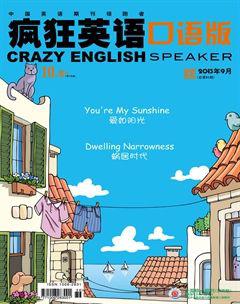年过50的人应该分点财产给年轻人
By Barbara Kingsolver
The problem is that most of the worlds stuff belongs to people who dont need it. Young people start off with 1)scarcity while old peoples houses get stuffed with books theyve already read, and cookware and sports equipment theyll never use again, and this one-way “stuff” street piles up at one end. The solution is easy. Age “50”, I think is the 2)statistical mid-point of adult life, so it should also be the peak of material possession. After that we should be required to own less each year than we did the year before. Heres[sic] some strategies for de-accumulation. When you move, pack up your stuff, number the boxes and leave the odd-numbered ones on the 3)curb. If you want to leave your kids an 4)inheritance, start early. They wont complain. On your birthday, call people younger than you and invite them to walk around your house and take things. If you feel attached to something, fine, hide it. Otherwise let it go. Life makes more sense with the goal of exiting exactly as we entered, with nothing at all.
问题是世界上大部分的物质都属于那些不需要它的人们。年轻人一开始就处于物质匮乏的状态,而老年人的房子里却塞满了已经看过的书籍、他们不会再用的各种厨具和运动器械,这种单向的物质链会把物质在一头堆积起来。解决的方法很简单。50岁,我想这个年龄正处于人生的中点,也是物质拥有量的顶峰时期。在此之后我们应该每年都比上一年拥有更少的物质。这里是一些减少物质堆积的策略。当你搬家时,整理好你的东西,给用于整理的箱子编号,把奇数编号的箱子丢在路边。如果你想给你的孩子们留遗产,可以早点这样做,他们不会抱怨的。在你生日那天,打电话给比你年轻的人,然后邀请他们到你的房子走走,拿走一些东西。如果你对某物依依不舍,没问题,把它藏起来。否则就把它让给别人。“生不带来,死也不带去”,这样的人生会更有意义。

